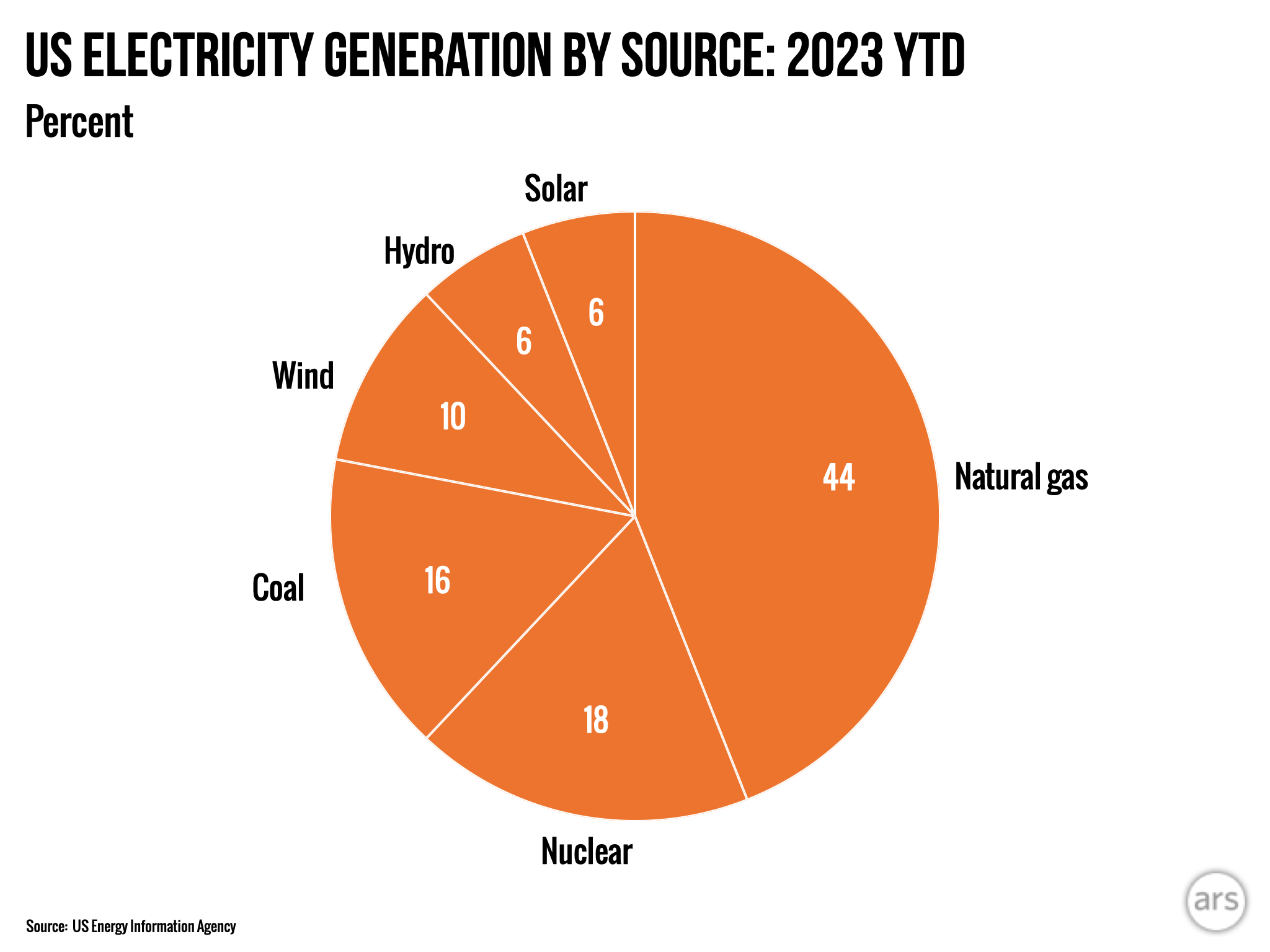It is cheaper to operate and that has been it’s selling point for the last years.
In case you’re ever wondering, this is an example of your tax dollars at work. Thirty years ago solar and wind generation had to be heavily subsidized with government grants to make them viable in the energy market. Now the technology of both has advanced to the point that it’s undercutting all of the other forms of electricity generation, without subsidization.
Government subsidies work. They’re effective for getting new technologies off the ground.
Good thing we still subsidize petroleum
Good for the oil companies and legislators they own, anyway
Don’t forget the retirees that rely on the stock prices dividend payouts in their 401ks.
Those IRAs and 401ks that are the only alternative after states and corps plundered all the pension systems to buy those politicians.
They are great. As long as they don’t end up like corn.
Or oil and coal, propping up bad energy sources while the clean ones have to often fend for themselves and compete against the subsidies.
Or oil and corn and meat and dairy.
The four elements of power.
Solar PV tortillas taste awful and hurt my teeth.
So now the coal and oil power plants require government subsidies.
No whether or not any of that has been effective I couldn’t tell you, especially considering those communities aren’t historically fond of democratic administrations.
Everything I find shows them as still being subsidized and receiving the lions share of energy subsidies, which is fine in my book.
Everything I find shows them as still being subsidized and receiving the lions share of energy subsidies
According to Senator Sheldon Whitehouse, the bulk of our state and federal subsidies are tilted towards fossil fuels.
As we’ll hear today, the United States subsidizes the fossil fuel industry with taxpayer dollars. It’s not just the US: according to the International Energy Agency, fossil fuel handouts hit a global high of $1 trillion in 2022 – the same year Big Oil pulled in a record $4 trillion of income.
In the United States, by some estimates taxpayers pay about $20 billion dollars every year to the fossil fuel industry. What do we get for that? Economists generally agree: not much. To quote conservative economist Gib Metcalf: these subsidies offer “little if any benefit in the form of oil patch jobs, lower prices at the pump, or increased energy security for the country.” The cash subsidy is both big and wrong.
It should be noted that your link only explores federal subsidies, while Whitehouse notes the bulk of subsidization that happen at the state and local level. Texas, for instance, invests enormously in public works that benefit fossil fuel producers while offering the administrative offices generous grants and tax forbearances to operate within the state.
Because energy consumption underpins the bulk of our commercial activities, there is a real net-benefit to keeping raw fuel and electricity prices artificially low. Market rate energy would constrict capital construction and real estate development, reduce employment rates, and increase inflation - generally speaking, it would cut into long term economic growth. The OPEC embargo of the 70s demonstrated as much.
At the same time, fossil fuel consumption yields a host of side-effects - degradation of air and water quality, rising global temperatures leading to more sever weather and sea levels which increase the rate of coastal erosion, wholesale destruction of agricultural land and waterways where spills occur, etc.
So subsidies aren’t bad on their face, but fossil fuel subsidies - particularly at the scale of current energy consumption - carry far too many negative externalities to be considered good long term policy.
Unfortunately, the political benefits of fossil fuel subsidy continue to outweigh the social consequences, leading to a political class that is financially invested in continuing subsidies that have long since transformed into a net negative for domestic growth.
It is now. But only after we invested in it.
This is a great example of investing in tech even when it’s not practical in the present day. It can pay off later down the line.
Well that and the US fracked a shit ton of natural gas which became the goto fuel to burn.
Natural gas isn’t emissions free. We’re talking about wind, hydro, nuclear, and solar.
A brainiac. Says it right in the article. Perhaps you can explain how you get from carbon based fuels to 100% noncarbon based when billions have been spent to fire natural gas. What’s going to move that 44%
A good chunk of that is nuclear which is not cheaper to operate.
This is economics now, not politics. US can go full crazy Trump, but the grid will just keep getting greener as greener is cheapest. He can rant and rave about global warming being a conspiracy or anything else, but it’s unstoppable now.
The infuriating thing to me is, renewable energy is often extremely independent. It means no reliance on foreign oil. That SHOULD be the most American thing, especially for those in the GOP who claim to be anti-government.
Goes to remind you their main product is hypocrisy.
Going one step further, EVs let you refuel using anything that can spew out high enough power without requiring the normal grid. You’d figure the “they’re warring against Christmas” doomers would be all over that 😂
Not nearly as easy to refine oil in your backyard.
No, the grid won’t get greener if Trump is elected because he WILL go full dictator. And he will revert everything that is being done currently.
He’ll struggle to make states to buy more expensive energy. If he managed, he’d put the state at a global disadvantage. Even then, he’d have to outlaw solar to stop people installing it at home.
That’s what tanking the EPA is for. Without any oversight of externalities, dirty energy becomes cheaper.
Environmental Protection Agency?
Sorry, I don’t follow.
Yes the Environmental Protection Agency. The Heritage foundation is taking applications and they vet by looking at whether their social media accounts supports Trump: https://www.project2025.org/
Last time Trump did their best to push responsible people out of government jobs, but that was just a test run. This time around it would be a speed run.
Edit: per Wikipedia https://en.m.wikipedia.org/wiki/Project_2025
The plan would perform a swift takeover of the entire executive branch under a maximalist version of the unitary executive theory
Like a lot Trump stuff, that is a whole bag of crazy! Yet another reason to hope he doesn’t get in.
Here’s the summary for the wikipedia article you mentioned in your comment:
The Environmental Protection Agency (EPA) is an independent agency of the United States government tasked with environmental protection matters. President Richard Nixon proposed the establishment of EPA on July 9, 1970; it began operation on December 2, 1970, after Nixon signed an executive order. The order establishing the EPA was ratified by committee hearings in the House and Senate. The agency is led by its administrator, who is appointed by the president and approved by the Senate. The current administrator is Michael S. Regan. The EPA is not a Cabinet department, but the administrator is normally given cabinet rank. The EPA has its headquarters in Washington, D.C., regional offices for each of the agency's ten regions, and 27 laboratories.The agency conducts environmental assessment, research, and education. It has the responsibility of maintaining and enforcing national standards under a variety of environmental laws, in consultation with state, tribal, and local governments. EPA enforcement powers include fines, sanctions, and other measures. It delegates some permitting, monitoring, and enforcement responsibility to U.S. states and the federally recognized tribes. The agency also works with industries and all levels of government in a wide variety of voluntary pollution prevention programs and energy conservation efforts. The agency's budgeted employee level in 2023 is 16,204.1 full-time equivalent (FTE). More than half of EPA's employees are engineers, scientists, and environmental protection specialists; other employees include legal, public affairs, financial, and information technologists.
Still plenty that can be done to stop it. Preventing transmission lines, giving even bigger subsidies to fossil fuels, putting large tarrifs on imported solar panels and wind turbines. Just look at California the power monopoly is in with Gavin Newsom and they created rules that protect their profits above all else and now solar installs is at 20% what it was before.
You mean 120% of what it was? 20% of what it was means way cheaper, and I’m sure you mean more expensive.
Sure but it’s self defeating, making things more expensive. Putting that whole state/country at a disadvantage against those who use cheap clean power instead of fighting it.
I think they were referring to installations, not cost.
I think you’re unfamiliar with California’s new policy it doesn’t change the cost to install but how much you pay and make for electricity. Basically now you sell electricity to the grid for 3-5 cents and buy it for like 10-15 but then they tack on like 20 cents in transmission fees. So it has made solar not cost effective anymore in most residential cases. So the total number of yearly installs has decreased to 20% compared to last year. But my point was a radical government can do plenty of stuff to sabotage progress in order to keep themselves and friends in power.
Don’t sell to the grid if you can avoid it. Charge a house battery, charge a EV, run all your stuff for the day. Always better to use than sell back to the grid anyway.
But my larger point was that by harming green energy, you harm energy costs and harm the economy. It becomes less competitive to economies who ride reality instead of fight it.
And yes, I don’t know California policies. Hand up, I’m a Brit who just champions green energy transitions. I watch https://grid.iamkate.com with glee.
but the grid will just keep getting greener as greener is cheapest.
Really? As somebody that works in the power space, how exactly do you figure that? Nuke aside, which people constantly complain about, the NRC doesn’t like to renew licenses, doesn’t want to grant new ones, that leaves wind and solar, both are money pits, waste more than they generate, and have a horrible environmental impact both from lost land, spent panels that can’t be recycled or thrown out as they’re toxic as hell, wind farms need never ending maintenance and again, cost more to run than they give back.
Until modular nuke become the norm and coal plants are retro’d, standard nuke plants are the absolute best bet. There’s no consiracy to keep older coal plants alive, sorry, that’s political stupidity. Every power company on the planet would dump them if they could. They’re a nightmare to operate and keep going.
Easier to recycle solar pannels and wind turbines than burnt coal or gas…
Solar and wind are now the cheapest power. https://www.eia.gov/outlooks/aeo/electricity_generation/ Both can be mixed with other land use. Both are still undergoing material use evolution.
Fission is always going to be an issue because humans aren’t grown up enough to handle the waste. https://www.scientificamerican.com/article/nuclear-waste-is-piling-up-does-the-u-s-have-a-plan/
Let alone running them safely. https://en.m.wikipedia.org/wiki/List_of_nuclear_power_accidents_by_country So I’m pretty uncomfortable with standardized nuclear modules (sub reactors) being distributed far and wide.
Maybe fusion will be different, but it always seams decades away.
Here’s the summary for the wikipedia article you mentioned in your comment:
Worldwide, many nuclear accidents and serious incidents have occurred before and since the Chernobyl disaster in 1986. Two thirds of these mishaps occurred in the US. The French Atomic Energy Commission (CEA) has concluded that technical innovation cannot eliminate the risk of human errors in nuclear plant operation.
How exactly do solar and wind waste more money than they generate? There is hardly anything that requires less maintenance. I put panels on my roof and just forget about them for 20 years. No space wasted, no maintenance.
Compare that to a nuclear power plant. How long does it take to build one? France is building new ones for I don’t know, 5 or ten years? And once it’s built, how much land does a NPP require? How much staffing and maintenance? They have massive cooling requirements so they always need to be built close to water. Did you know that France had to power down about half their NPPs in the summer because the rivers didn’t carry enough water? You say that solar is toxic as hell, then what is nuclear? What exactly is the plan with waste? Bury it somewhere really really deep and keep fingers crossed for thousands of years that it doesn’t contaminate ground water? And what’s with all the irradiated parts of the plant itself? How can you recycle them?
Any way you cut it, nuclear is a grandiose, but extremely risky and costly technology.
How exactly do solar and wind waste more money than they generate? There is hardly anything that requires less maintenance. I put panels on my roof and just forget about them for 20 years. No space wasted, no maintenance.
LOL, you didn’t just compare an ignorable amount of low grade consumer panels to a solar site did you? How many millions did you spend to clear land? How much did you spend on hundreds of employees, trucks, fuel, constant oh shit moments over the course of 1-2yrs to build the thing? How many millions in environmental consulting and never ending harassment from the municipality that you’re building it in? How about all the legal fees from the lawsuits from the environmentalists that are conveniently the same ones that claim they want green power?
Also, you don’t get to claim you get to forget about anything until that 20yrs has passed and your system hasn’t shit it’s pants, I got a handful of buddies that work for solar contractors and they fuck up all the time. You know how many bad batches of panel there are out there that don’t even come close to living their lifespan? Depending on the “Deal” you got, that’s not always covered either, espeically when the companies that put them in make the majority of the money from taking the tax credits from it.
Did you know that France had to power down about half their NPPs in the summer because the rivers didn’t carry enough water?
Yes, I did. You realize there’s a difference between powering down, and downpowering right? Plants downpower all the time for a host of reasons, part of the deal with nuclear.
What exactly is the plan with waste? Bury it somewhere really really deep and keep fingers crossed for thousands of years that it doesn’t contaminate ground water?
No, and that’s never been the plan. The industry is always working on better ways to deal with the waste, in Nuclear’s case, even building pools although a pain in the ass, is safe, including literally falling into the thing.
And what’s with all the irradiated parts of the plant itself? How can you recycle them?
They’re decontaminated and removed. Happens all the time during outage season and during repair. What can’t be totally decontaminated is transported to where it can be.
What is toxic in solar panels? While I’d love it if they would actually recycle the silver, copper, and 99.99% pure silicon, most of the time it ends up the same place the fiberglass turbines do: ground into industrial sand for concrete. Also the aluminum is already recycled anyway. There are several recyclers for solar panels popping up as the scale of solar increases to better take advantage of the materials, but they are already fully recycled Also coal plants are shutting down and being edged out by natural gas anyway. I don’t know what sources you are using, but they are either out of date or wrong.
What is toxic in solar panels?
Mainly lead and cadmium, and they can be recycled, that’s not the problem, the problem is the cost of doing it vs sticking them in a landfill. Nobody wants to spend 5x to recycle something that’s dead to them and can’t generate income anymore, vs dumping it.
Quick everyone, downvote to oblivion because this guy actually is educated in the subject
That guy sounds more like that pilot I know bitching how noise and pollution regulations make their job now difficult or even take their wings. It’s not because they’re in the biz they’re not biased.
Meanwhile where I live, solar panels and wind turbines are happily recycled.
That sounds pretty different actually. On one hand you have someone talking about being inconvenienced.
On the other hand you have someone in the industry talking about practicality. Biased or not, people that work in their respective areas generally know the most about that same area, as opposed to random people online.
From where I’m sitting is still a random person online. I mean, I worked in a power plant for some time. It doesn’t make me an expert for the whole sector.
I actually work in the industry and am definitely educated in the subject and I can say with 100% certainty that guy is not in the industry and is full of shit.
No. No it’s not. EOTW in a decade tops. If it ain’t hell incarnate then it’ll be a virus, bio-, tech-, software, etc., maybe that comet, whatever. Unless you FOSS everything NOW…Goodbye…forever.
This guy frets
I don’t do that. Stop reading emotions in texts. Your not psychic here.
I think I’ll ignore this
Can I get that in English?
They can correct me if I’m wrong, but I think what they’re saying is there are numerous reasons that the world can and will be over in the next decade. The only solution to this, as they see it, is to make everything free and open source. If we don’t, we’ll all be doomed.
The planet will live. We won’t.
No. I only speak in psychedelic and psychic drugs. Inhale some cognitive dimensioner perception accelerator already. Your last chance before…
That’s a very cool article, I didn’t know the US was actually making the change so quickly.
Weirdest part of the article is the included pie chart from the US Energy Information Agency showing the usage of different types of energy, but the entire pie is orange, like every slice of different energy is orange.
They need one art guy, just one.
I didn’t mind the pie chart, the slices are labeled clearly, no need to use coloring like you have to read a legend.
Kind of you
 Hmmm… This pie needs more nuclear.
Hmmm… This pie needs more nuclear.Why? Nuclear power is the most complex and expensive option of any clean energy source from what I know.
And yet, after many decades of solar, wind construction. It is the energy source in that pie chart that is sizeable (just as much as all wind and solar) and extremely stable (probably for the last 50 years), without any major construction in the past 30 years minimum.
Wind/solar only ramped up in the last 10 years, not decades. That’s when they got cheap. Really cheap. It’s nuclear that had a huge head start.
To be fair, Plant Vogtle just turned on Unit 3 earlier this year and Unit 4 should be coming soon.
modern gen 4 plants are MUCH simpler, foregoing PWR loop entirely in favor of liquid metal/salt type reactors, with various different design choices that are all much simpler, and cheaper to build/maintain.
If we see actual development in that field it’s not hard to imagine them playing with the fossil fuels, possibly renewables as well given the base load productivity, and relative lack of waste.
That’s a good thing. It means lots of hours of well paying engineering and construction work.
Nearly all of nuclear in the USA was built decades ago. Instead of being “paid off” and being cheaper, its still more expensive to generate electricity with nuclear than nearly all other electricity sources in the USA.
Nuclear is the most regulated one. Start requiring full recycling / disposal of solar or wind and how expensive do they get?
Nuclear is the most regulated: True. Accidents in nuclear have the most consequence, by far, of any generation source.
I would imagine that if we’re just going for disposal, solar and wind are still pretty cheap. With zero recycling wind turbine blades can just be buried after their 25 year life cycle. source.
Same landfill disposal option is available for solar panels at $1 to $5 per panel. source
This would be the level of disposal nuclear has, except low and high level nuclear waste is much more costly and potentially destructive even after disposal.
Burying it in the ground with no considerations for leachants is not what nuclear disposal is.
I’m not sure what you are referencing, but there are good reasons why nuclear power is expensive: lots of engineering and construction hours, strick safety and quality standards for design and materials, and no externalities, since decommissioning and waste handling have to be accounted and baked into the final utility cost to consumers. In other words, even if it’s difficult to pay off a nuclear power plant (in a liberalized energy market of course) it’s still money well spent. The same requirements and expectations should have to apply to other industries as well.
It’s not significantly more expensive though. https://en.wikipedia.org/wiki/Cost_of_electricity_by_source
And even if it was, it has other benefits.
Like using significantly less land, and being safer.
It can also work as a source of heat for district heating or various industrial processes, and since the plants themselves have no emissions, they can be reasonably placed in cities for this purpose without harming people. Using heat directly is more efficient than converting it to and from electricity.
Nuclear has it’s place.
It’s not significantly more expensive though. https://en.wikipedia.org/wiki/Cost_of_electricity_by_source
I’m looking at that source it shows:
- nuclear $6,695-7,547 /kw
- solar pv $1,327 /kw
At the most generous calculation (of nuclear costly only $6,695) that puts nuclear power at 5 x more expensive that solar PV. So if you have a theoretical pure electricity bill on solar PV of $100/month, your theoretical pure electricity bill on nuclear of $500/month.
I’m not sure how you reach the conclusion that nuclear is not significantly more expensive.
Here’s the summary for the wikipedia article you mentioned in your comment:
Different methods of electricity generation can incur a variety of different costs, which can be divided into three general categories: 1) wholesale costs, or all costs paid by utilities associated with acquiring and distributing electricity to consumers, 2) retail costs paid by consumers, and 3) external costs, or externalities, imposed on society. Wholesale costs include initial capital, operations & maintenance (O&M), transmission, and costs of decommissioning. Depending on the local regulatory environment, some or all wholesale costs may be passed through to consumers. These are costs per unit of energy, typically represented as dollars/megawatt hour (wholesale). The calculations also assist governments in making decisions regarding energy policy. On average the levelized cost of electricity from utility scale solar power and onshore wind power is less than from coal and gas-fired power stations,: TS-25 but this varies a lot depending on location.: 6–65
‘Natural’ gas is just gas. It’s not a clean emission free fuel. It’s better than coal but by no means a clean fuel.
It has about half the carbon emissions of coal. Much much better, but no where close to clean.
Better than coal is its main selling point.
And converting coal power plants to natural gas can be a partial interim solution on the way towards larger amounts of non-polluting generation.
Also needs less coal.
And after that less natural gas, but getting rid of coal should be the higher priority as it is the greater polluting fuel.
Fair. I wonder if the chart includes the coal typically needed to make steel.
unless that coal is somehow also generating power, i doubt it, electricity production including a source that isn’t electricity production is… weird.
Okay I guess it should have been obvious to me.
I, too, want the one that will take longer and cost more than alternatives.
I don’t think you understand what the alternatives are
Yeah, no. I used to be pro-nuclear. Then I looked at how the economics have changed over the last 10 years, and I changed my mind like you’re supposed to when presented with new information.
I like how governments are supposed to shit their money out of the window to support renewables with billions in incentives but when the matter is investment in nuclear power suddenly it’s unsustainable economics. Let’s ask Germany how their 600+ billion euro “energiewende” is going shall we?
Nuclear got tons of subsidies. Lots of those plants were built for the dual purpose of energy and making bombs. It’s unlikely the United States would have half the reactors it does if not for the Cold War.
At this point, it’s a matter of what’s most efficient for energy alone, and that ain’t nuclear. Take out every subsidy in every form of energy, and the people with money to invest will put it all in wind and solar.
Wait really, no joke??
Not in my state, we’re like 10-15% emission free wind and solar), and like 60-70% from coal.
Believe it or not, your state was included in the national average
Wait. That’s how averages work? The more you know…
What I think is interesting is just how variable it is. This Wikipedia article breaks it down by state. There’s no obvious political explanation here, and even very similar states have very different energy production.
For example, here’s the top 10 (with 2016/2020 presidential party vote):
- Vermont (D) - 99.7%
- South Dakota ® - 82.7%
- Washington (D) - 81.9%
- New Hampshire (D) - 71.6%
- Idaho ® - 70.2%
- Maine (D) - 66.1%
- Oregon (D) - 65%
- Illinois (D) - 64.5%
- South Carolina ® - 60.8%
- Kansas ® - 60.8%
And the bottom 10 (ignoring DC):
41 - Massachusetts (D) - 17.8%
42 - Ohio ® - 17.4%
43 - Florida ® - 17.4%
44 - Missouri ® - 16.6%
45 - Utah ® - 12.4%
46 - Indiana ® - 9.8%
47 - Kentucky ® - 7.6%
48 - Rhode Island (D) - 7.2%
49 - West Virginia ® - 5.1%
50 - Delaware (D) - 3.2%So 6/10 of the top 10 are states that voted Democrat, and 7/10 of the bottom 10 are states that voted Republican. That trend doesn’t really tell the story though (3 of the next 5 voted Republican), which is really interesting because it’s such a political talking point at the national level (e.g. Dems are in favor of green energy, Reps are in favor of fossil fuels).
Even some very similar, adjacent states have very different generation numbers:
- Alabama (43%) vs Mississippi (20%)
- Idaho (70%) vs Utah (12%)
- Tennessee (59%) vs Kentucky (8%)
So there’s a lot of progress that can be made at the low end by pointing at their neighbors.
What I think is interesting is just how variable it is.
The states themselves are very different from each other.
Try breaking it down by county.
It’s better than nothing. Hopefully we can speed this up in next couple of years.
That’s actually better than I thought.
In my city they had everyone switch to renewable energy, they sent Mail out stating that your energy source will automatically change unless you opt out.
Same AFAIK – Akron, OH.
Why do they need to ask? I ask as in the UK we all get our power from “the grid”, and don’t have much say over what the energy mix is there.
Finally some good news.
There’s a lot if you look for it, recent developments in tidal are incredibly positive and we’re absolutely going to see a rapid uptake in marine electrification as existing technology progresses through the market. Most people never really think about the resources used and pollution caused by small boats but one of the big destructive forces at play is the infrastructure requirements - small boats need big boats to supply their fuel stations.
Transitioning away from this system and instead using costal tidal generators to charge electric ferries and barges could be a total game changer in many areas, especially many of the highly trafficked and polluted tidal basins like in north Brazil, Nigeria, or island clusters like in the Philippines. Also the intercoastal waterways around the US and other leisure spots.
We’re making great progress in many areas and I really think it’s important to acknowledge this and cheer it on least we get so caught in a false sense of doom that we just give up.
Its not good news at, all electricity prices have gone up a lot since this net-zero insanity took over. Morons are clapping their hands like trained seals at their bank accounts being drained by corporations and politicians.
Wanting to breath clean air on a habitable planet isn’t insanity.
The air is plenty clean as it is, has been for decades too… as long as you don’t live in California, where the smug is so thick it’s asphyxiating.
The air is plenty clean as it is
Tell that to the people in East Palestine Ohio. Tell that to the people that live near coal plants.
as long as you don’t live in California
Doesn’t matter where you live if the planet is uninhabitable.
All prices have gone up in the same window you describe!
This is due to corporate greed. Solar and wind are the cheapest sources of energy in the history of the world.
Great except the military pollutes more than 140 countries and there are several wars ongoing. If you really want the climate to stop we need to reel in the international shipping industry, the fashion industry, and also the global war machine.
You also have to admit that the US covers for most of the worlds military. Most of nato and many Asian allies have very low defense spending, because the US will cover them. Most of the time when there is a global crisis or localized crisis the US is involved in one way or another.
This makes electric cars less polluting with every passing day as this percentage increases.
Car manufacturing is, itself, a messy process. And we’d all be better off (for a whole host of reasons) if we could move to a public transit system and away from the messy, overly-complex, extraordinarily expensive highways-and-byways personal vehicle system.
Electrified rail and Multi-family homes would dramatically reduce both energy consumption AND housing costs, if we were willing to invest in it at rates comparable to what we spend subsidizing new fossil fuel wells, road expansion/maintenance, and policing of the homeless.
That’s very surprising, in a good way.
This is the best summary I could come up with:
But some of the trends now seem locked in for the year: wind and solar are likely to be in a dead heat with coal, and all carbon-emissions-free sources combined will account for roughly 40 percent of US electricity production.
Weather can also play a role, as unusually high demand for heating in the winter months could potentially require that older fossil fuel plants be brought online.
This is in keeping with a general trend of flat-to-declining electricity use as greater efficiency is offsetting factors like population growth and expanding electrification.
Its output has been boosted by a new, 1.1 Gigawatt reactor that come online this year (a second at the same site, Vogtle in Georgia, is set to start commercial production at any moment).
But that’s likely to be the end of new nuclear capacity for this decade; the challenge will be keeping existing plants open despite their age and high costs.
The explosive growth of natural gas in the US has been a big environmental win, since it creates the least particulate pollution of all the fossil fuels, as well as the lowest carbon emissions per unit of electricity.
The original article contains 849 words, the summary contains 191 words. Saved 78%. I’m a bot and I’m open source!
60% of US electricity still isn’t emissions-free
The only thing that’s keeping carbon-free power from growing faster is natural gas, which is the fastest-growing source of generation at the moment, going from 40 percent of the year-to-date total in 2022 to 43.3 percent this year. (It’s actually slightly below that level in the October data.) The explosive growth of natural gas in the US has been a big environmental win, since it creates the least particulate pollution of all the fossil fuels, as well as the lowest carbon emissions per unit of electricity. But its use is going to need to start dropping soon if the US is to meet its climate goals, so it will be critical to see whether its growth flat lines over the next few years.
Uh… So, listen. I work in the Nat Gas sector. And while I’m happy to confirm that its far cleaner, easier/safer to transport, and more efficient than coal and liquid oil, I’m going to have to pump the breaks on the enthusiasm. We are definitely not “emissions-free”. One of the larger investments we’ve made, in the last few years, has been in detecting gas leaks along our existing lines and plugging them. And we definitely still flare off excess and lose reserves during transit as circumstances dictate.
Way back in the 1970s a small upstart energy company known as Exxon had one of its engineering departments estimate the ecological impact of drilling into the East Natuna gas field off the coast of Indonesia. This was primarily a natural gas reserve, accessible without the modern fracking and cracking techniques used throughout the Permian and Delphi Basins.
Senior scientist of Exxon, James Black, authored a report estimating the impact of drilling and burning off the fuel in the East Natuna reserve, and concluded it would result in a significant increase in global temperatures. This lead Exxon to commission further studies, in the late 70s and early 80s, to estimate the full impact of their drilling and refining practices. The end result was a model of climate change that has mapped neatly to current climate trends
I say this because while natural gas is relatively cleaner, it is by no means clean. And with the increasing rate of energy consumption occurring globally, our reliance on natural gas is decidedly not contributing to an emissions free future.

















